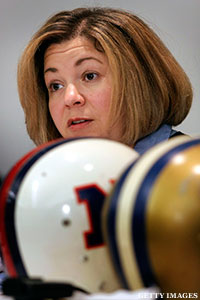
An attorney by training and a member of Congress by trade, Linda Sanchez knows verbal dissembling -- read: pure, unadulterated bull excrement -- when she hears it. Case in point? During a 2009 Capitol Hill hearing on brain trauma in the National Football League that included commissioner Roger Goodell, the Democratic representative from California introduced a 2007 video clip from HBO's "Real Sports" featuring neurologist Ira Casson, then the co-chair of the league's panel on head injuries.
Interviewer: Is there any evidence, as far as you're concerned, that links multiple head injuries among pro football players with depression?
Casson: No.
Interviewer: With dementia?
Casson: No.
Interviewer: With early onset of Alzheimer's?
Casson: No.
Interviewer: Is there any evidence as of today that links multiple head injuries with any long-term problem like that?
Casson: In NFL players?
Interviewer: Yeah.
Casson: No.

"[The NFL's] actions smacked of them knowing it was a very serious problem," Sanchez says. "And them trying to deny it and cover it up with very vague-sounding and un-alarming information, because, let's face it, there's a heck of a lot of money at stake. If they could deny and delay anybody putting this together, then they could avoid being held liable for these former players suffering these very severe aftereffects.
"It reminded me of the tobacco industry, who knew for years and years that smoking wasn't good for you but kept denying it."
No. No. No. No more. Last week, the family of Dave Duerson -- the former Chicago Bears safety who committed suicide by shooting himself in the heart, the better to preserve his brain for scientific study -- filed suit against the NFL, contending that the league's mismanagement of Duerson's on-field concussions resulted in his brain damage and ultimate death. Hundreds of other former players have filed similar suits since last summer, seeking recompense for football-induced headaches and memory loss, depression and dementia, emotional turmoil and cognitive decline. Each complaint alleges essentially the same thing: The NFL knew there was a problem. Knew that concussions can and do produce serious, long-term harm. Knew this and did nothing -- failed to adequately warn players about the risk, failed to protect them with proper care and treatment, failed to help when they later became ill, once-robust men laid irrevocably low by the ticking time bombs exploding inside their heads. Worse still, the league knew and pretended otherwise, plausibly denying and implausibly lying and actively covering up, hiding behind phony prudence and junk science, slow-walking the issue into the dank corner of a dark closet, raking in billions all the while, just like Big Tobacco before them.
The NFL says otherwise. Firmly and consistently, the league claims it handled concussions the best it could given the medical information available at the time; moreover, it intends to fight the lawsuits, four of which have been consolidated in a Philadelphia federal court. Chances are, the league will prevail. It has money. It has lawyers. It has the kind of lawyers that money buys. The NFL can afford to make the battle long, costly and technical; according to sports law expert Michael McCann, it can make a strong defensive case in terms of strict legal culpability. But never mind that. Even if the league wins in court -- even if it escapes a potentially damning future discovery process unscathed -- it already has lost. Lost whatever remains of its carefully burnished cultural sheen, its implicit, NFL Films-fueled claim to be something greater than big-budget human cockfighting, a red-blooded, all-American enterprise that can kick off the Super Bowl with a pious recitation of the Declaration of Independence while maintaining a straight face. Because the NFL doesn't just have a legal duty to the helmet-smashing men who make its profits possible. It has a moral duty, too. And on that front, the league has failed.
Failed miserably, in fact.
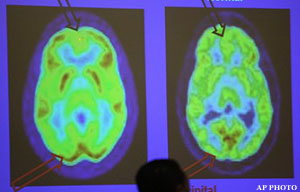
Start with the science. Medical research dating back to the 1920s indicates that suffering multiple blows to the head that are not allowed to properly heal can result in degenerative and irreversible cognitive impairment -- known in boxing as "punch drunkenness." Yet despite presiding over a violent contact sport in which both concussions and sub-concussive head hits are de rigueur -- and that's just during practice -- the NFL did not formally begin to investigate the issue until 1994, when the league formed its Committee on Mild Traumatic Brain Injury. Heading the group? Former New York Jets team doctor Elliot Pellman. Not a neurologist. A rheumatologist. A man who claimed in his biographical material that he had a medical degree from the State University of New York at Stony Brook, when in fact he reportedly attended medical school in Guadalajara, Mexico. A man who shared the following moment with concussed Jets receiver Wayne Chrebet during a 2003 game against the New York Giants, later detailed by ESPN writer Peter Keating in a chilling magazine article:
"There's going to be some controversy about you going back to play." Elliot Pellman looks Wayne Chrebet in the eye in the fourth quarter of a tight game ... A knee to the back of the head knocked Chrebet stone-cold unconscious a quarter earlier, and now the Jets' team doctor is putting the wideout through a series of mental tests. Pellman knows Chrebet has suffered a concussion, but the player is performing adequately on standard memory exercises.
"This is very important for you," the portly physician tells the local hero, as was later reported in the New York Daily News. "This is very important for your career." Then he asks, "Are you okay?"
When Chrebet replies, "I'm fine," Pellman sends him back in.
Appearing on HBO's "Inside the NFL" that same year, Pellman flatly dismissed a study linking multiple concussions with depression among former players. Months later, Pellman and his colleagues produced a paper stating that there was "no evidence" that concussions produced "permanent or cumulative" damage; in 2006, they published a summary of their work to date, declaring "mild traumatic brain injuries" -- read: concussions -- "in professional football are not serious injuries."
Read that again: concussions do not qualify as a serious injuries. Are these the kind of doctors you want looking after your son?
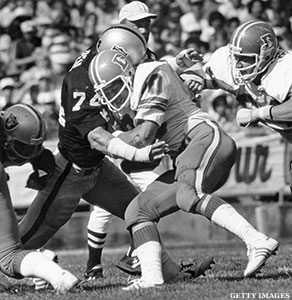
Unsurprisingly, independent medical scientists found serious fault with the committee's methodology and conclusions. So did Sanchez. One reason? Pellman and company drew many of their conclusions from voluntary surveys that had been mailed out to a small number of retired players. "A lot of these players who are suffering, they have dementia or are living on the street," Sanchez says. "They don't have the wherewithal to full out a survey. They don't have an address. So the results were very skewed, showing there wasn’t a problem. That made me sick to my stomach."
Likewise, independent research contradicted the NFL committee, demonstrating that multiple concussions significantly increased players' risk of cognitive disease and impairment. For example, a 2005 study of over 2,550 former players found that individuals who had suffered three or more concussions during their pro careers were five times more likely than retirees without a history of concussions to be diagnosed with a loss of brain function affecting memory, thinking, language, judgment and behavior.
How did the NFL respond? Think Phillip Morris. Committee member Mark Lovell attacked the above study, claiming that the league wanted to "apply scientific rigor to this issue to make sure that we’re really getting at the underlying cause of what’s happening ... you cannot tell that from a survey." (Right. Because surveys aren't credible, unless paid for by the league). Time and again, committee members denied a link between concussions and cognitive decline. They asked for more time to study the issue. They claimed that independent scientists were drawing premature conclusions. In 2007, some of those same independent scientists gave face-to-face presentations to committee members; afterward, the NFL released a statement that in part read:
Current research with professional athletes has not shown that having more than one or two concussions leads to permanent problems ... It is important to understand that there is no magic number for how many concussions is too many.
The worst example of the league's see-no-evil approach came when forensic pathologist Dr. Bennet Omalu dissected the brain tissue of dead NFL players such as Pittsburgh Steelers Hall of Fame center Mike Webster. Omalu published an article in the academic journal Neurosurgery concluding that football-related head trauma caused the players to suffer the mind-destroying disease chronic traumatic encephalopathy (CTE). Pellman and two other committee members didn't just blow Omalu off -- they wrote a letter to the journal attempting to discredit his research. According to a scathing 2009 GQ magazine article, the NFL repeatedly dismissed Omalu before sending an independent expert to examine his work in 2008. The expert, neuropathologist Peter Davies, initially was skeptical -- that is, until he saw Omalu's slides, which contained the brain tissue of once-mad, now-deceased football players. "The credit must go to Bennet Omalu," Davies told the magazine. "Because he first reported this and nobody believed him, nobody in the field, and I'm included in that. I did not think there was anything there. But when I looked at the stuff, he was absolutely right. I was wrong to be skeptical."
The NFL's response? According to the magazine, the league declined to make Davies' report public and never spoke to Omalu again. One year earlier, however, it did give active players a pamphlet asserting that the link between concussions and long-term brain damage remained an open question -- a position the NFL finally disavowed in 2010, in the wake of its public shaming before Congress and concurrent with new members of a reconstituted concussion committee publicly blasting their predecessors' work as "unacceptable."
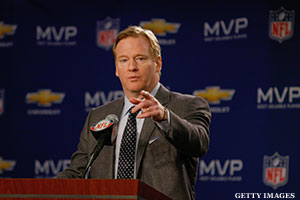
Speaking of said predecessors: Also in 2010, Casson finally appeared before Congress in person at a follow-up hearing in Detroit. Having resigned his position on the NFL concussion committee -- probably not a coincidence, given that former players disparagingly referred to him as "Dr. No" -- he nevertheless doubled-down on his public assertion that there wasn't enough "valid, reliable or objective" scientific evidence to link repeated football head trauma and long-term brain damage. Sanchez was incredulous. When she asked Casson if the link between getting hit in the head and brain damage was a generally accepted medical principle, the doctor refused to answer directly, but did note that he wasn’t "saying that concussions are good for you."
"That was the strongest thing I could get him to say," Sanchez says. "And he was employed by the NFL to study this. I can’t put into words how shocking that was."
By denying the obvious -- that concussions are, in fact, profoundly not good for you -- the league may have reduced its legal culpability in the current wave of lawsuits. As a leading brain scientist told ESPN’s Keating, "They're basically trying to prepare a defense for when one of these players sues ... they are trying to say that what's done in the NFL is OK because in their studies, it doesn't look like bad things are happening from concussions." But the NFL also did its players a grave, unforgivable disservice. Remember Chrebet? After suffering multiple concussions over the course of his football career, he retired in 2005; two years later, he was still suffering from headaches and lethargy. Or take Dave Pear. A former Pro Bowl defensive tackle and Super Bowl winner with the Oakland Raiders, the 58-year-old Washington state resident still remembers how concussions in pro football were handled in the 1970s. "If you even talked about them, you were less than a man," he says. "You got knocked out, they held out four fingers. You’d say two. They would say, 'Close enough, get back out there.' There just wasn’t a whole lot of concern about our heath."
Since 2004, Pear has been unable to work, instead collecting federal disability payments. The reason? It isn't his creaky spine, even though that has been operated on. It isn't his ruined hips, both of which have been replaced. It's his damaged brain. Eight years ago, a clinical psychologist concluded that Pear had "significant memory impairment as the result of repeated head injuries" and possibly was displaying "signs of early onset dementia." Today, he suffers from vertigo, chronic headaches and short-term memory lapses. Even during the day, he has a hard time staying awake. "I try to keep my mind active," he says. "I read a lot. But with head injuries, it doesn’t get better. You just try to maintain some level so you can function. The reality is, it’s your wife and your children that pay the biggest price."
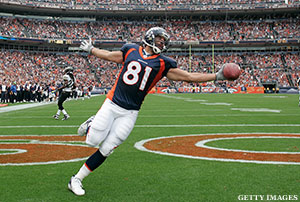
The potential price worries Nate Jackson. A Denver Broncos tight end from 2003 to 2008 -- the same time period as the NFL's most adamant concussion stonewalling -- Jackson always measured football in terms of its rewards. Money. Women. Status. Pride. A irresistible grab for ephemeral glory, no matter now badly his body ached. "As a player, you don't keep your best interests in mind," he says. "There's always something more powerful pulling you back on the field. When everybody tells you that this athletic talent you have is very, very important, well, what are you without it? How do you step outside of that and think rationally?"
While catching a pass during a 2008 game, Jackson was hit in the head by Cleveland linebacker Willie McGinest. The shoulder-to-helmet blow knocked Jackson out. Almost certainly concussed, he was never diagnosed with a brain injury. Nor was he tested for one. He didn't think to ask. Didn't want to know. "The [team doctors] knew I was [expletive] up," Jackson says. "They saw the hit. The trainer was telling me not to move my neck. But I intentionally made as little of a deal as I could about it. I didn't want to go sit in a training room. This was before concussions were a big deal. They weren't stressed to us. No specific meetings about it. No points of emphasis from the coaches."
Jackson spent the next three days in bed. Now out of football and writing a book about his experience, he wonders if the blow -- or countless others like it -- will come back to haunt him. "As a tight end, every day I had to smack my head into another dude's head, over and over again," he says. "I don’t know if it's my imagination, but I feel like I can literally feel my brain getting kicked in when I read about concussions. It's a scary thought to consider where I might be in 20 years."
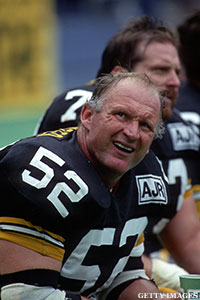
During this year's Super Bowl, the NFL aired a 60-second commercial about player safety, a slick spot in which the evolution of the game and its rules unfolded over the course of a single kick return, one era morphing into the next. Leather helmets became plastic. Players acquired facemasks. At the end of the spot, Baltimore Ravens linebacker Ray Lewis intoned, "Here's to making the next century safer and more exciting. Forever forward. Forever football." Maybe so. But missing from the ad was the league's brain trauma dissembling morphing into acceptance. Casson's no becoming a yes. In the here and now, the NFL touts its born-again concussion religion. A public crackdown on helmet-to-helmet hits. Universal return-to-play guidelines for players who have been concussed. Big, bright, liability-limiting posters, right there on locker room walls, stating that concussions can lead to devastating long-term cognitive damage. The league even donates money to medical researchers dissecting ex-players' brains, the same kind of research it once pooh-poohed.
All of that is good. But none of it is enough. Not when Cleveland quarterback Colt McCoy is concussed from a brutal, helmet-to-chinstrap hit in a game last December -- and then sent back onto the field in the same game, potentially risking his life, because no one on the Browns medical staff noticed. Not when the league reportedly wanted to insert a concussion liability waiver into new player contracts, starting with this year's draft. (A league spokesman denied the report). And not when hundreds, maybe thousands, of brain-damaged former players need so much help, financial and otherwise, assistance they shouldn't have to go to a courtroom to secure.
"The NFL doesn't walk away from this issue looking like a standup league," Sanchez says. "They just don't. They're moving in the right direction, but the fact remains that here are guys who are really, seriously messed up, health-wise, continuing to struggle and the league continues to ignore that. They have to go back to the guys that didn't make millions of dollars when they played. They have got to make it right by them."
Pear concurs. He says he made just over $600,000 in his pro football career. He says he has spent all of it and more on medical bills. A plaintiff in one of the concussion lawsuits, he isn't looking to make a quick buck. He's simply trying to survive. "I'm going to have medical bills the rest of my life from playing football," he says. "I want to be compensated for what the NFL has put myself and my family through. I want to see all my football brothers compensated. I want to see the NFL be to be honest about the sport. It's hazardous to your health."
A few years ago, Pear's phone rang. Goodell was on the line. He wanted to talk. Pear says he had been getting a bureaucratic runaround from league and players association disability services, that he needed help and had gotten nowhere. He also runs a blog that acts as a kind of clearinghouse and group therapy session of for retired players, many of them disaffected and struggling, some of them now concussion plaintiffs as well. The commissioner wanted to know what the problems were, and how he could help. "I made him listen to my grievance for 25 minutes," Pear recalls. "He kept trying to get off the line, getting more and more exasperated. Finally, he said, 'Who do you think I am, God?'"
Pear pauses.
"I said, 'No, Roger, you're the commissioner of the National Football League. It's your duty to protect the integrity of the game. You need to clean up this mess."
Popular Stories On ThePostGame:
-- What Should Jeremy Do? Plenty Of Options For Cashing In On Linsanity
-- Justin Verlander Pitches 'Fastball Flakes' Cereal To Benefit Veterans
-- NFL Combine: Fastest 40-Yard Dashes
-- Jeremy Lin: His Impact On Changing The Perception Of The Asian American Male








